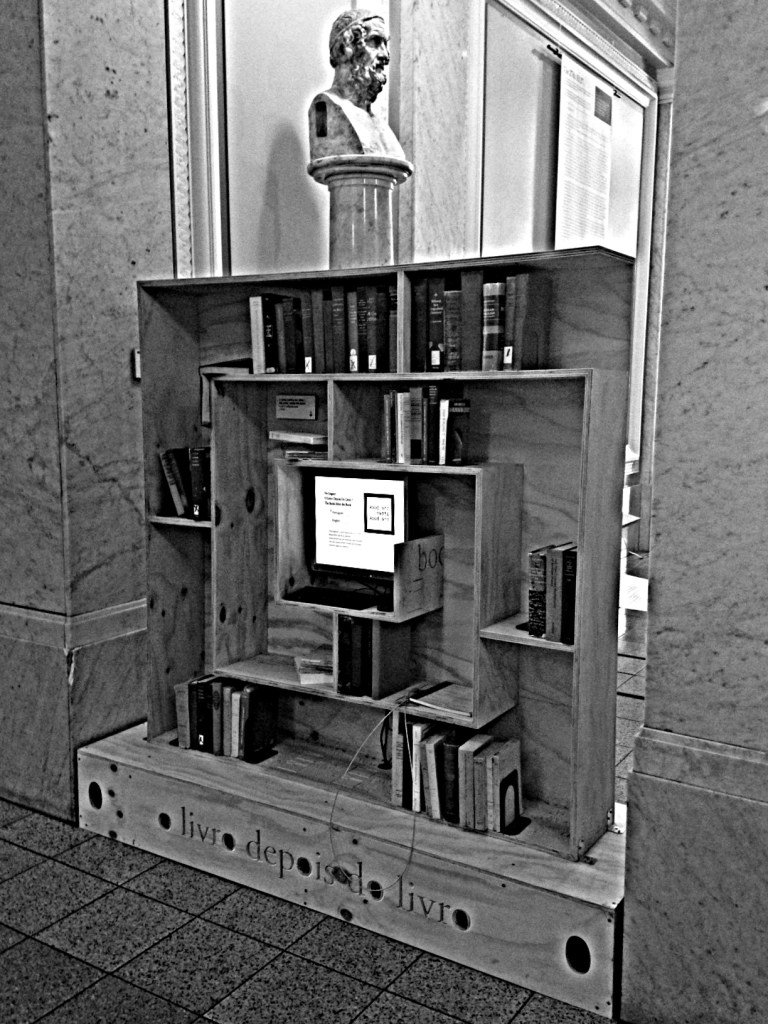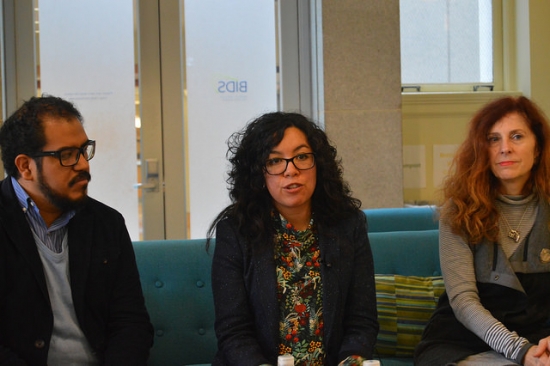On March 11th, an interdisciplinary community gathered at Doe Library to celebrate the opening of No Legacy || Literatura Electrónica The exhibit, co-curated by DH Fellow Alex Saum-Pascual, Assistant Professor of Spanish, and Élika Ortega, Postdoctoral Researcher at the Institute for Digital Research in the Humanities at the University of Kansas, examines electronic literature’s roots in Spanish and Portuguese experimental fiction. An international set of speakers joined the exhibit’s opening symposium and offered their thoughts on electronic literature, preservation and curation practice, and the field’s transnational and translinguistic characteristics.
Ortega, tracing the origins of the exhibit, posed No Legacy’s location in Doe Library as an intervention in the library setting. “We move away from the computer or media lab, the art of museum gallery, and the classroom in order to both claim the library as a place for electronic literature and to bring the works in close proximity of the traditions from which we seem to disconnect them and reconnect them back again.”
Dene Grigar, Professor and Director of The Creative Media & Digital Culture Program at Washington State University Vancouver, examined what it means to preserve a work of electronic literature. Grigar is Co-PI for the Pathfinders project, which approaches e-lit preservation by capturing “not just the work of art but also the user’s experience with the work.” To that end, the project has collected an impressive array of hardware, but also a rich audio-visual record that includes traversals of the work by authors and readers.
Roberto Cruz Arzabal, Professor at the Universidad Nacional Autónoma de México, described e-lit as real, but immaterial culture objects. A work of of e-lit, Arzabal noted, is not just composed of the code, the content, or the object containing it. Arzabal questioned how one might build an archive that “preserves but doesn’t immobilize.”
Leonardo Flores, Professor of English at the University of Puerto Rico, Mayagüez, reflected on his editorial work on The Electronic Literature Collection, Volume 3(ELC3), published earlier this year. With ambitions to speak to a global audience, the editors of ELC3 sought to produce a collection that struck a balance between inclusiveness and a high standard for quality. Flores emphasized the importance of diverse editorial boards, where editors can activate author networks in non-English languages and outside of North America.
Sandy Baldwin, Associate Professor of English at the Rochester Institute of Technology, discussed his work in seeking out alternative legacies of electronic literature and work to connect underrepresented languages and groups to the burgeoning international community of electronic literature.
 Citing Jessica Pressman, Saum-Pascual emphasized that e-lit must be read comparatively across both human and programming languages. An analysis must also consider specificities of hardware, software, network configurations. Saum-Pascual noted that one of e-lit’s greatest accomplishments is “[locating] narrativity not as a literary universal, but as one of the many qualities best realized in the particular medium of print.” Approached from this viewpoint, Saum-Pascual suggested that “digital media would not be a threat to the life of books or literature but would help us in our reevaluation relocation of this very slippery term, the literary.”
Citing Jessica Pressman, Saum-Pascual emphasized that e-lit must be read comparatively across both human and programming languages. An analysis must also consider specificities of hardware, software, network configurations. Saum-Pascual noted that one of e-lit’s greatest accomplishments is “[locating] narrativity not as a literary universal, but as one of the many qualities best realized in the particular medium of print.” Approached from this viewpoint, Saum-Pascual suggested that “digital media would not be a threat to the life of books or literature but would help us in our reevaluation relocation of this very slippery term, the literary.”
No Legacy will be on display at the Bernice Layne Brown Gallery in Doe Library until September 2, 2016. Watch the recorded opening symposium on YouTube or explore pictures and tweets from the event.
Resources:
- Read about other electronic literature projects on the DH at Berkeley blog
- Blog: “How to Read an e-book…From 1991”
Kate Tasker (Digital Archivist, Bancroft Library) and Jay Boncodin (Library Computer Infrastructure Services) and discuss the Bancroft Library’s work on preparing pieces for the No Legacy exhibit - Resource guide: Writing Interactive Fiction with Inform 7
